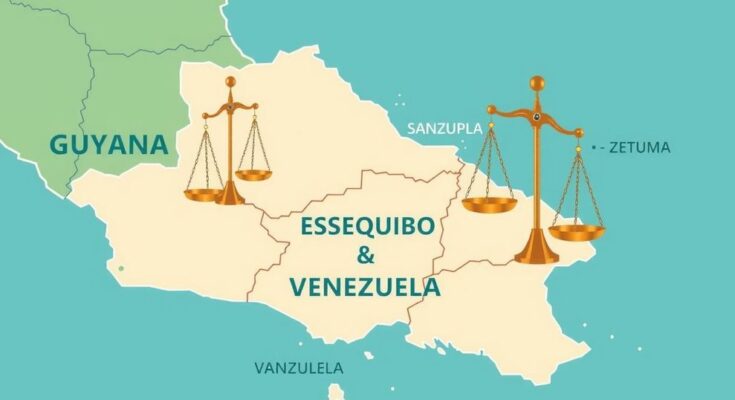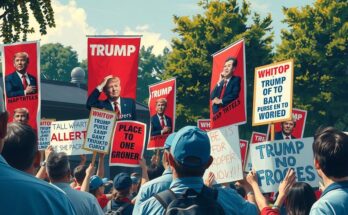On the eve of Guyana’s 59th independence celebration, Venezuela’s government announces plans to hold elections in the Essequibo region, a territory legally recognized as part of Guyana. This action raises serious international law concerns, complicating the long-standing territorial dispute. The ICJ’s authority is called into question as Venezuela proceeds despite a clear Court order against such actions. Increased tensions on the ground signal the potential for conflict, leaving the international community to advocate for resolution through dialogue and diplomacy.
On May 25, Guyana will celebrate its 59th year of independence. However, this year’s festivities are overshadowed by a controversial election planned by Nicolás Maduro’s government in the Essequibo region, which constitutes a significant portion of Guyana, specifically two-thirds of its land. These actions raise alarm, as they seemingly disregard established international legal standards. The move signifies a dangerous escalation in Venezuela’s territorial claims, adding tension to an already precarious situation regarding the rule of law and the International Court of Justice (ICJ) authority.
Essequibo has been recognized as part of Guyana since an 1899 arbitral award, decided by a tribunal featuring Chief Justices from Russia, Britain, and the United States—nominated, notably, by Venezuela. This award not only confirmed borders but was initially celebrated by Venezuela, which then ratified it through its own National Congress. At the time, this expanded Venezuela’s access to key regions, including the mouth of the Orinoco River, a pivotal area for resources.
For over sixty years, the boundary was stable. But, in 1962 Venezuela lodged a challenge against the 1899 agreement at the United Nations. Further complicating matters, following a Geneva Agreement in 1966, both nations consented to a series of negotiations aimed at resolving the outstanding border issues. Importantly, this Agreement authorized the UN Secretary-General to determine a final resolution if negotiations fell short.
Fast forward to 2018, after many years of stalled dialogue, the Secretary-General referred the dispute to the ICJ, invoking the authority granted by the Geneva Agreement. Guyana promptly sought the Court’s ruling affirming the validity of the 1899 award. Initially, Venezuela contested the Court’s jurisdiction and opted out of participation. Although it later submitted written materials, it has not accepted the Court’s authority, regularly ignoring its directed interim measures. Most recently, on May 1, 2025, the Court ordered Venezuela to refrain from any electoral activities in the disputed territory.
Despite this explicit injunction, the Venezuelan National Electoral Council has declared its intent to organize elections in Essequibo, including electing eight deputies and a governor. Details remain scant—there is no public information concerning voter registration, polling locations, or even administrative logistics. This lack of clarity is not surprising, considering Venezuela has no established administration within Essequibo, or indeed, however, in Guyana.
The Maduro administration justifies this unilateral action through an alleged 2023 domestic referendum conducted without outside verification. Based on this controversial vote, the government asserts the right to claim Essequibo. Legislation known as the “Organic Law for the Defense of Guayana Esequiba” reinforces this stance—declaring the formation of a new Venezuelan administrative area while suggesting governance from Tumeremo in Bolívar State, within Venezuela’s borders.
This naturally begs a fundamental question: how can any nation conduct elections in regions it does not control? The uncomfortable truth is that it cannot unless through outright occupation, which would infringe upon international law, ICJ directives, and the foundational tenets of both the United Nations Charter and the Organization of American States.
Rather than driven by a sense of patriotism, this latest Venezuelan initiative appears to result from geopolitical and economic motivations, largely stemming from the region’s rich natural resources. Oil, gold, timber, and freshwater have taken on new significance amid Venezuela’s ongoing political and economic turmoil. Therefore, it seems that these resources are influencing the Venezuelan government’s actions more than any legal precedents.
Moreover, tensions on the ground are escalating. Guyanese defense authorities have noted provocations from Venezuelan military forces, signaling potential conflict. The Guyanese government has warned that participating in these elections could lead to criminal charges under national law. With around 100,000 Venezuelan migrants currently in Guyana—many having fled from dire conditions in their homeland—drawing them into a politically charged scenario could put their safety at risk.
The international community must take these developments with the utmost seriousness. The ICJ should be respected as the agreed framework for resolving this long-standing conflict. Actions taken in defiance of the Court undermine the entire international order designed to mediate such disputes. Caribbean and Latin American nations, along with global allies, need to issue a strong message that borders cannot simply be redefined through national decrees. Elections conducted outside of recognized jurisdiction will hold no legitimacy, and are likely to provoke further unrest.
Both Guyana and Venezuela occupy the same geography; neither can simply relocate. Thus, they need to pursue a pathway towards coexistence. However, this cannot be achieved through unilateral measures or threats—it must be rooted in respect for international law and a willingness to engage in diplomacy. Awaiting the ICJ’s ruling is essential. Future relations should build upon that ruling, aiming for mutual benefits for both nations.
In conclusion, the way forward towards peace should focus on diplomacy and adherence to law. That path to resolution must not be abandoned, for the stakes have never been higher.
In summary, Venezuela’s planned elections in the Essequibo region, despite being inside Guyana’s internationally recognized borders, signal a concerning disregard for established international legal frameworks. The situation raises serious questions regarding territorial authority and escalates tensions between the two nations. Diplomatic dialogue and respect for the ICJ’s authority remain crucial for lasting peace in the region, and any unilateral actions that further complicate the matter must be met with strong international opposition.
Original Source: www.thestkittsnevisobserver.com




